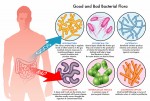(photo from trustedtherapies.com)
Every year, 15 out of every 100,000 Canadians is diagnosed with inflammatory bowel disease (IBD). More concerning are the statistics for Ashkenazi Jews, one of the more at-risk populations for the disease.
IBD is a group of inflammatory conditions that affect the gastrointestinal tract, or the gut, explained Dr. Charles Bernstein, a gastroenterologist working at Winnipeg’s Health Science Centre (HSC) and the University of Manitoba (U of M).

Speaking at the Victoria Inn in Winnipeg at a gala to raise funds for Crohn’s and colitis research, he said, “They’re associated with symptoms of abdominal pain, diarrhea, sometimes weight loss, rectal bleeding … and they’re quite common in young people. The peak age of incidents is in the 20s for Crohn’s, although it can actually present at any age.”
According to Bernstein, these diseases often mean a high burden, especially when they present in teens or young adults. “With ulcerative colitis, there is a rise in the 20s, but [the rate] plateaus. And the incidences are quite similar with every decade of life. And, since there isn’t a high mortality rate associated with the diseases, people carry these diseases throughout their life.”
Although the cause for the conditions remain mostly unknown, the doctor said research has moved forward considerably in the last decade and a half, at least in so far as understanding some of the contributing factors. Research has primarily focused on developing better “Band-Aid” solutions, such as ways to control the body’s response with anti-inflammatory and immunosuppressant drugs. “This, in a sense, allows us to put the genie back in the bottle,” said Bernstein. “In Crohn’s disease, we don’t know what’s causing the act of inflammation, so we don’t have a specific treatment. So, it’s different than taking penicillin for infectious [bacterial] pneumonia. We know we are taking the antibiotic to treat a specific thing and the pneumonia goes away.”
These diseases are more prevalent in Ashkenazi Jews, though they are by no means the only ethnic group affected. For several years, the focus has been on the genetic components to these diseases. Today, however, there is a more research into possible environmental factors, Bernstein said, and these deserve more attention.
“Indians from India are quite unlikely to get these diseases,” he said, by way of example. “Although these diseases are [now] emerging in India, the rates are substantially lower than in a country like Canada. But, when Indians move to Canada, like they do in B.C. in large numbers, they may not, as adults, get IBD while living in B.C., but their children seem to be at a comparable risk as white kids growing up in B.C. It’s an important area of investigation right now, trying to understand what these environmental factors are that drive these diseases to emerge.”
Diet is one area for research. “There’s a great interest in diet and what it is about the diet in the Western world, in particular in Canada, that may impact bugs present in our bowel and the response to them. Also, smokers are more likely to get Crohn’s than non-smokers, but we don’t understand what it is about smoking that impacts the development of the disease.”
The genetic “cure” has proved elusive as yet, even with a great deal of research in that area. “Because of all the work that’s gone into genetic work, we understand that probably most of the genes are associated with Crohn’s. But, we’ve not been able to find some gene switch to treat and, therefore, turn off the disease.”
According to Bernstein, the rate of IBD among Ashkenazi Jews is higher in Canada than Ashkenazi Jews in Israel, which, he posits may be due to the very different environment and, to some extent, different dietary patterns of Ashkenazi Jews living in Israel versus those living in Canada.
“Ashkenazi Jews have the machinery to … develop IBD when confronted with whatever the environmental triggers are, but my suspicion is that the environmental triggers are higher in North America than they are elsewhere.”
“With a rate of approximately 250 cases per 100,000 in the population at any one time, and while the rates in B.C. are slightly lower than elsewhere in Canada, the rates are as high in Canada as anywhere in the world. And the prevalence rates of these diseases amount to about 240,000 Canadians with Crohn’s disease or ulcerative colitis – probably 140,000 have Crohn’s disease and 100,000 have ulcerative colitis.”
The burden to sufferers of IBD is when they are experiencing symptoms that interfere with their work, sports or social life, their quality of life.
“We can get 95 percent of people’s symptoms controlled, so it doesn’t have to have a big impact on their life,” said Bernstein. “There are a small percentage of people with chronic, grumbling symptoms that we can’t control.”
These conditions contribute a significant cost to society, as well, when IBD sufferers are either missing work or are going to work but are not able to function to their full potential. There are also direct costs for managing these diseases via providing doctors, nursing services, medication, hospital coverage, etc.
“For some of the drugs, we use a category called ‘biologicals’ or the antibodies of TNF [tumor necrosis factors],” said Bernstein. “They can cost 30- to 35,000 dollars per year.
“Our centre in Winnipeg has been among the leaders in exploring not just the burden of the disease, but also the psychosocial factors that impact the disease – understanding how stress, anxiety and depression impact the disease and vice versa.”
Dr. Brian Bressler a gastroenterologist at St. Paul’s Hospital in Vancouver, echoes Bernstein’s concern about being too focused on the genetic component of the disease.
IBD issues become problematic when one’s immune system is inappropriately activated and causing damage and inflammation in the bowels, Bressler explained in an interview. “Many genes have been identified as putting people at an increased risk of having these problems and there are environmental influences in the world that, when exposed, can increase one’s risk of their immune system not working properly,” he said. “This doesn’t mean that if you have the gene defects you’re going to get it. It’s more likely than not that you won’t get IBD, which is why we don’t tell people routinely to get checked just because they have the genes.
“The highest risk is having a sibling who has Crohn’s or ulcerative colitis, but even if you have a sibling it’s still likely you’re not going to get it.”
When it comes to getting IBD under control, Bressler said that controlling inappropriate immune system response is key, as this leads to inflammation and to potentially serious bowel damage.
To date, there is no cure, but the focus is on ensuring that the disease is as controlled as possible. “In general, patients present with symptoms and not feeling well because of a multitude of problems,” said the doctor. “While some are able to control symptoms by changing their diet, there’s no diet that has been proven to be effective in managing IBD.”
It is important to try to make adjustments to diet and lifestyle, however. “Sometimes, patients don’t have any symptoms, but they are still having their immune system causing damage. This can lead to permanent problems in the bowel.”
Another option for some cases is surgery. There are four types of surgical procedures used to treat the symptoms of Crohn’s, for example, depending on the specific complication, the location in the GI tract and the severity of the symptoms. Surgical approaches include re-section, colectomy, proctocolectomy and strictureplasty. There is a light on the horizon for future IBD treatment, however. “Newer medical therapies are a little more sophisticated,” Bressler said. “They are a little more specific in targeting certain problems driving the inappropriate immune response. An older therapy, like prednisone [a steroid], is more [about] global control of the immune system. This is sometimes necessary and many times works, but does have a lot of side effects and long-term complications. There are newer therapies that can treat the inappropriate immune response, without leading to so many side effects.”
Rebeca Kuropatwa is a Winnipeg freelance writer.

